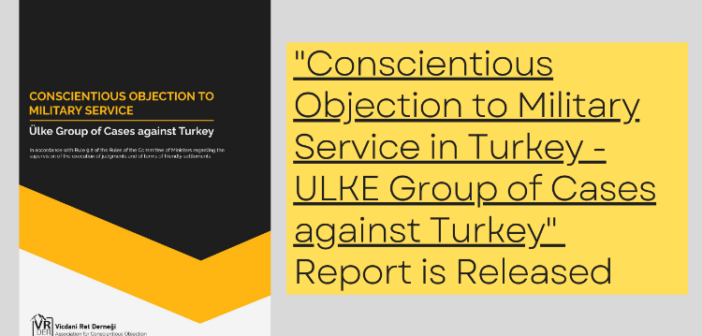The Association for Conscientious Objection, together with four international organisations, informed the Committee of Ministers of the Council of Europe on the developments regarding conscientious objection in Turkey.
Conscientious Objection Association, Freedom of Belief Initiative, Norwegian Helsinki Committee, War Resisters International, European Bureau for Conscientious Objection and Connection e.V. has made a joint submission under Rule 9.2 for the implementation of the judgments in the Ülke Group cases. The application, prepared with the support of the Etkiniz EU Programme, has been submitted to the Committee of Ministers of the Council of Europe.
Background
Since the European Court of Human Rights judgement of Ülke v. Turkey in 2006, regarding the case of conscientious objector Osman Murat Ülke, the Committee of Ministers of the Council of Europe (CoM) has been monitoring Turkey for the implementation of this judgment, as well as others related to conscientious objection to military service, under a qualified monitoring procedure.
In this context, the CoM has asked the Turkish Government several times to submit an “action plan” that includes political and practical measures regarding the recognition of the right to conscientious objection to military service. The latest action plans submitted by the Turkish government are dated 31 March 2020 and 5 August 2021.
Because Turkey’s action plans of August 2021 and March 2020 were almost identical, the organisations have submitted an updated version of their report from 2020 to the CoM.
You can access the detailed report of “Conscientious Objection to Military Service in Turkey” (May 2021) on which the joint submission of the organisations to the CoM is based, here.
Highlights from the report:
- Turkey continues to deny the right to conscientious objection to military service.
- The government does not have any policy regarding conscientious objection to military service.
- As the right to conscientious objection is not recognised, there is also no mechanism for conscientious objectors to apply.
- Along with their freedom of religion and conscience, other fundamental rights and freedoms of conscientious objectors, including their right to work, right to vote and stand for election, right to travel, right to education, and their right to own property are also interfered with.
- The report presents 60 cases of conscientious objectors who approached the Association for Conscientious Objection between December 2020 and September 2021. The infographics containing the data from these cases are included in the report.
- Conscientious objectors in Turkey are living in a vicious circle of ID checks, fines, prosecutions, trials, fines and/or imprisonment. This vicious circle results in aggravated executions and the interference with the rights mentioned above. A report of the Conscientious Objection Association (dated May 2021) stated that a total fine of 575,517 TL (approx 35,500€) was imposed in 85 cases filed against conscientious objectors. The new report adds new cases to this data. According to the updated data, in August 2021, conscientious objectors Uğur Yorulmaz and Abuzer Yurtsever were fined 59,140 TL (approx 3,660€) and 18,666 TL (approx. 1,155€) respectively, in addition to the aforementioned total amount of fines received by conscientious objectors.
- The rights violations conscientious objectors are suffering result in them leading a life under conditions of ‘civil death’.
- The local courts and the Constitutional Court do not provide effective domestic remedies for conscientious objectors. According to our report, to date, conscientious objectors have made at least 45 separate applications to the Constitutional Court, and almost all of these cases continue to be pending.
- “Paid military service” is not a viable option for conscientious objectors due to political and conscientious reasons. In addition, considering that those who want to benefit from this option have to pay 43,151.18 TL (approx 2,275€) at the time of the release of this report, it’s also economically extremely difficult for many to consider this option.
The report also includes recommendations to the Turkish Government and the Committee of Ministers of the Council of Europe, which can be found in its last section.




